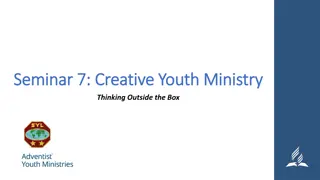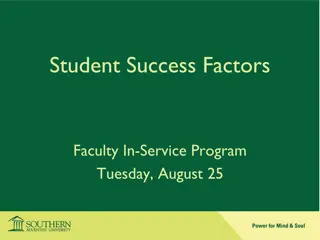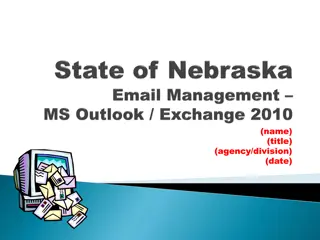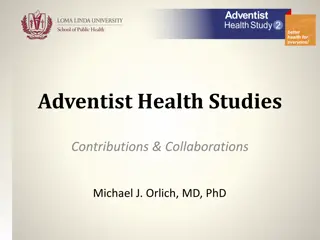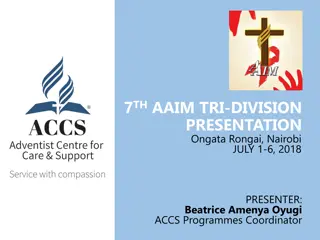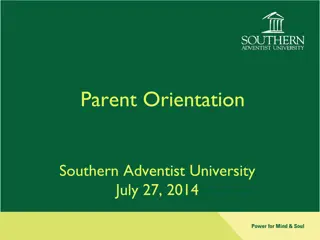Insights into Adventist Youth Ministries and Retention Factors
The content covers various aspects of Adventist Youth Ministries, including the Ambassador program for the 16-21 age group. It delves into the likelihood of different age groups leaving the church, reasons for church members leaving, responses to individuals who stop attending church, and insights from a Global Retention Survey. The content also highlights the origins of the Ambassador program and its focus on engaging youth in church activities.
Download Presentation

Please find below an Image/Link to download the presentation.
The content on the website is provided AS IS for your information and personal use only. It may not be sold, licensed, or shared on other websites without obtaining consent from the author.If you encounter any issues during the download, it is possible that the publisher has removed the file from their server.
You are allowed to download the files provided on this website for personal or commercial use, subject to the condition that they are used lawfully. All files are the property of their respective owners.
The content on the website is provided AS IS for your information and personal use only. It may not be sold, licensed, or shared on other websites without obtaining consent from the author.
E N D
Presentation Transcript
Adventist Youth Ministries
Ambassador Overview Elder Kevin Soweto (MNE) Adventist Youth Ministries
Which age group is more likely to leave the church? Ambassadors Ministry Child (never baptised) 1% Middle Aged 35% Youth (College) Old Age Middle Aged Youth (College) 64% Child (never baptised) Old Age 0%
Reasons why people leave the church Ambassadors Ministry Lack of friends 41% Too many conflicts in local church 15% Personal conflict with members 11% Problems in marriage 8% Hypocrisy in church members 8% Personal or family tragedy 6% Disagreement with Adventist doctrines 5% Personal conflict with the pastor 2% Change of residence to another city 2% Decisions made by leaders 1% Praise in the church does not appeal to me 1% 0% 13% 25% 38% 50%
What Happened When They Stopped Attending Church Ambassadors Ministry 40% No one contacted me 19% A church member came to visit me 17% A local elder came to visit me 15% A local church member contacted me by phone 10% An Adventist relative made contact 09% The pastor came to visit me 06% The pastor contacted me by phone or Email 03% An Adventist, not a local member contacted me 02% I received a letter in the mail 0.3% Printed material was mailed to me
Global Retention Survey showed that: lack of perceived hypocrisy discipleship and involvement Triggered young people s decision to leave marital (and other) conflicts lack of support Respondents also shared that from their point of view people leave because of: lack of friends in the church lack of friends
The Beginning 01 The Vote & the Name An action was taken at the 2001 convention charging the General Conference Youth Ministries Department to develop materials for a new level of youth ministry to meet the need of the youth aged 16 - 21. For the purpose of differentiating this age group, the name Ambassador was chosen. 02 Focused Ministry The Ambassador level provides focused ministry for the 16-21 age group; it proposes a structured and organized way for them to become actively involved in their church, both locally and globally. This Ambassador manual introduces the first steps for preparing you to lead this late adolescent age group. 03 Personalized There is no such thing as a typical teenager. Teens are as varied as the rest of the population. Each teen you meet is an individual with a personality and distinct preferences. Not all teenagers like technology or computers. Not all of them are obsessed with the opposite gender. Not all teens are possessed by rebellious thoughts and inclinations.
The Ambassador Age Group Ambassadors Ministry Late adolescents are in the discovery phase of life. They want to differentiate themselves from others and they want to be allowed to question things they don t understand. Individuals in this age group want to know authentic, trustworthy people. They want to hear their name spoken. They want to be smiled at even when they don t feel like smiling back. They especially want to feel that the adults in their lives think they are important and worth something. The teenager thrives in an atmosphere of freedom to explore and grow within limits defined by caring and knowledgeable adults. This is your calling as a teen ministry leader: to grow healthy, God-knowing teens. The upper teen age group needs someone to lead, casting the way forward. They do not want or need someone to dictate, herd, lambaste, nitpick, or lecture. What teens need as their leader is someone who knows where they are going (to the Kingdom), genuinely lives the gospel, offers care and friendliness, listens without judging, is well prepared for meetings and events, knows Bible answers when called on, keeps Jesus in view at all times, has patience and a sense of humor about life, and can get the right help from elsewhere when it s needed.
The Logo Three concepts The cross in the logo points to the fact that Jesus sacrifice is the center of a relationship with Him. The cross on the earth is symbolic of His sacrifice, giving us hope of a new and better life both here on earth through the concept of servant leadership and through an earth made new at His return. The open book is the Word of God, the foundation for our faith, knowledge, and lifestyle. It is open because it s a message for us to internalize as our constant guide and companion. It is also for sharing with all who will freely receive it. The colours of the gradient in the back represents the sunrise. As the sun rises, the life of every ambassador goes up to grow in the knowledge and the love of Jesus. The logo has the intention of transmitting what are the key- points of this ministry.
Ten Objectives Ambassadors Ministry Make the number-one priority of your Ambassador programming to be the personal salvation of each and every teen who is a member. Inspire the teens to give personal expression of their love for God by teaching them how to be involved in various outreach activities. 1 6 Encourage teens to discover their God-given talents and to use their gifts and abilities to fulfil God s expectations for them. 2 Teach the teens specific vocational skills and hobbies that will provide them with purpose and employment opportunities. 7 Teach the teens to internalize God s love and His principles so that they will take responsibility for their walk with God and use His principles and the guidance of the Holy Spirit to make wise decisions in their lives. 3 Encourage the young people to develop and maintain physical fitness through an active, energetic, drug-free lifestyle. 8 Help teens to realize that God and His church love them and appreciate the implementation of their talents for the fulfilling of the gospel commission as established in Matt. 28:18 20 and Acts 1:8. Help them find fulfillment in their life with God as they share their beliefs with those whom God brings to them. 4 Provide them with opportunities to develop and demonstrate their leadership abilities. They will strengthen their resolve to learn and maintain appropriate internal discipline and apply their skills of resourcefulness and understanding of the processes of group dynamics. 9 Teach an understanding and love for God s creation through programs of adventure and discovery. The young people will find their fellowship with God to be more meaningful as they have the opportunity to experience that sense of wonder and worship as nature unfolds its deepest spiritual secrets as described in Romans 1:19, 20. 5 1 0 Provide ample opportunities for teens to interact in carefully supervised activities that will lead to and strengthen life-long committed relationships.
Seven Foundations Ambassadors Ministry A Christ- centered Discipleship Plan Leadership Development Character & Personality Development, including Outdoor, High Adventure Programming A Personal, Public, & Small Group Based Mission Lifestyle Lifestyle & Vocational Training Nurturing Godly Relationships Community outreach development through service projects and emergency preparedness training
Four Essential Elements Ambassadors Ministry Individual Discipleship Plan (IDP) Spiritual Companion Social Activities Projects 01 02 03 04
Four Essential Elements Ambassadors Ministry At the beginning of each module, each participant will choose a friend who will be their companion for the duration of the module. They will meet during each session to encourage and support each other in their role and growth as an Ambassador. Groups of spiritual companions will also come together for specific activities. This builds the concept of interdependence and accountability into the Ambassador experience. Spiritual Companion 01
Four Essential Elements Ambassadors Ministry At the beginning of every module, each participant will make a simple plan of how they would like to grow spiritually and acquire practical competency in the area of the upcoming module. Their spiritual companion will be there throughout the module to help and encourage them to accomplish their plan. The IDP helps to emphasize the continuing nature of discipleship and that learning is a continual part of life. By linking spiritual companions together for this work, it stresses the need for interdependence on each other as we learn, grow, and work for God. Guidelines for creating the IDP will appear in the Leader s Guide and Participant s Guide for each module. Individual Discipleship Plan (IDP) 02
Four Essential Elements Ambassadors Ministry Each module will have a project that will integrate the core concepts from the module into a service learning activity focused on helping others. This will be an opportunity for the Ambassador class to work together as a whole. You will find INSTRUCTIONS for setting up your project in the back pages of the Leader s Guide for each module. You might have to plan for multiple projects, depending on the size of your group. The main objective is to incorporate service as a way of life, rather than an occasional activity. Aim for projects that would call for regular involvement over a period of time. Make contact with your volunteer service organizations, the local council, and other entities that could assist you. If your group settles on a particular medium/long term project, there is no need to change the project when the time comes to engage with a new module. Use your discretion. Projects 03
Four Essential Elements Ambassadors Ministry Ensure that you plan for a social activity at least once a month. Make sure that you always provide opportunities for good and wholesome fun for that age group. You do not have to conduct all your sessions in a building. As appropriate, conduct some in nature, in the context of a camp, in someone s home, etc. Social Activities 04
Template for teaching sessions Ambassadors Ministry welcome & activity General welcome and opening prayer. A short getting-to-know you activity. As friendships continually deepen, so the ability to encourage and support each other spiritually deepens. 2+ minutes
Template for teaching sessions Ambassadors Ministry did you know? An activity that introduces the theme for the day. 13 minutes
Template for teaching sessions Ambassadors Ministry mission briefing A simple Bible study that gives the biblical foundation for the theme done in groups of two or three. The leaders should be ready to help at any time if needed. 10 minutes
Template for teaching sessions Ambassadors Ministry A personal reflection time where each participant writes down what they have personally learned from the Bible study and how this applies to their own life as an Ambassador. To be shared briefly with their spiritual companion who will be a spiritual encourager during the curriculum. thinking it through 5 minutes
Template for teaching sessions Ambassadors Ministry An activity that expands on the main theme for the lesson. This section is called reflecting Jesus and His kingdom because an Ambassador s main task is to represent who Jesus is to others, as well as what the kingdom of heaven stands for. reflecting Jesus & His kingdom 40 minutes
Template for teaching sessions Ambassadors Ministry Each participant will develop an individual discipleship plan that will help them grow as an Ambassador for Jesus outside of the learning environment. next steps At the beginning of each module in the curriculum, participants will develop an individual discipleship plan (IDP) that will guide their personal spiritual journey during that section. Each IDP will focus on the theme of that section. Next Steps is a time for participants to reflect on how their IDP is working and to pray for each other in what they aim to do next. This will be done with their spiritual companion. 15 minutes
Template for teaching sessions Ambassadors Ministry As a whole group, this is an opportunity to summarize what participants have learned during the session. It is a time for the leader to generally review what has been done and to ask for volunteers to briefly share what they have learned. summary 5 minutes
CREATING YOUR IDP Here is an example of what an IDP (Individual Discipleship Plan) will look like. Spiritual Companion: Reflection: How did I do? This is completed at the end of the module. It gives you a chance to reflect on what worked well and what you would like to improve in the future. You can compare your expected evidences of change to what actually happened. Who is the spiritual companion who will encourage and support you in the next stage of your spiritual journey of growing as an Ambassador of Jesus? They will remain your spiritual companion throughout the current module. Expected evidence of change: After looking at your personal vision statement, list the evidence you might expect to see that reveals you are growing in Christ. Step 4 Step 6 Step 1 Step 2 Step 3 Step 5 Next Steps: IDP Personal vision statement: List the practical steps you will take to accomplish your personal discipleship vision. Think about how these steps will also shape your daily devotions with God. Module Name: This includes two parts: Christ-Centered a. What do you see in your life today that you would like to change in order to become more Ambassador for Jesus? Discipleship effective as an b. Describe how you would like to see yourself in the future. Before you start writing, take a moment to pray for God to guide your thoughts.
For God has not given us a spirit of fear, but of power and of love and of a sound mind. 2 Timothy 1:7









